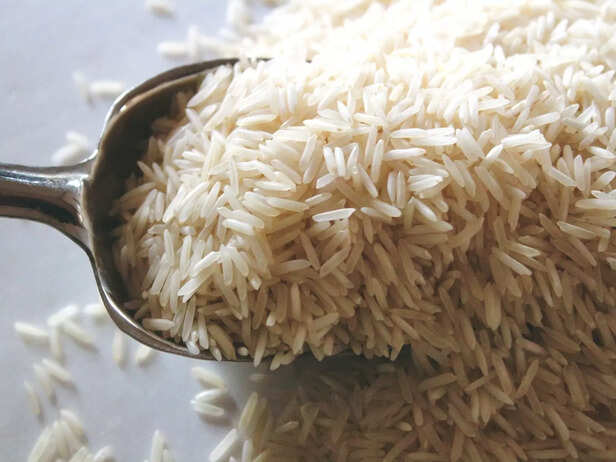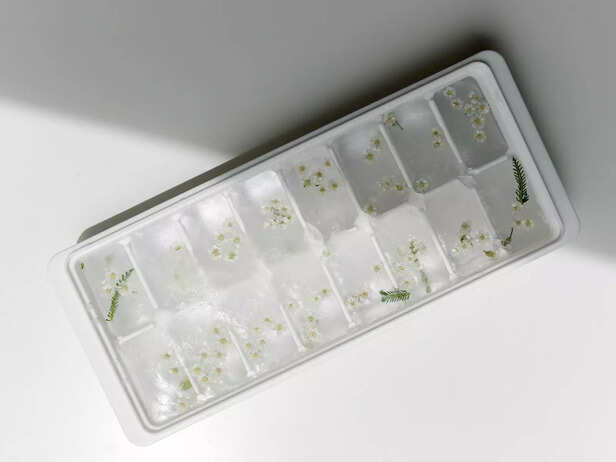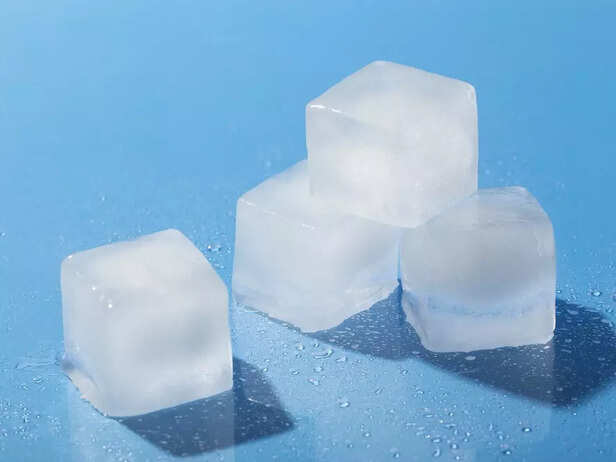How to Make Rice Water Ice Cubes for Glowing Skin
Ritika | Sep 20, 2025, 17:15 IST
Rice water cubes
( Image credit : Freepik )
Rice water ice cubes are now one of the simplest DIY skincare hacks out there. They take an ancient solution and give it a cool, modern spin. Cooling, hydrating, and brightening, they are a natural solution to rejuvenate dull skin. Cheap and easy, they deliver glow and serenity without expensive products, just rice, water, and a freezer.
Skincare is all about experiments. One day it's serums full of unknown acids, another day it's jade rollers or sheet masks from around the globe. But there are some treatments that remain constant, being passed over generations in hushed tones. Rice water is a good example. Rural women used to boil or soak rice, set aside the cloudy water, and afterwards wash their face or shampoo their hair using it. It was not science to them; it was habit, and the outcome was self-explanatory.
Now, the same rice water is in the process of being frozen into ice cubes, providing a cool spin on the old tradition. Picture the iciness on a sweltering afternoon, combined with nutrients that calm the skin. It's simple, feels high-end, and hardly costs a thing. That's likely why rice water ice cubes are making their way from grandma's kitchen tricks to TikTok skincare tips so smoothly.

Rice may not appear remarkable in its kitchen jar, but it contains more than carbs. When soaked or boiled, the remaining water goes cloudy since the grains release nutrients. Amino acids, antioxidants, and vitamins, chiefly B and E, are in that whitish liquid. These are the same types of things beauty companies sell in bottles for three-figure sums.
Rice water has been the acclamation of Asian skin care traditions all along. Japanese women centuries ago bathed in rice water and thought it maintained their skin soft and young. In some areas of Korea and China, it was used as a daily facial cleanser. Even today, K-beauty brands proudly tout "fermented rice extracts" as active ingredients.
And when you freeze it into ice cubes, you don't merely obtain those nutrients, you obtain the added benefit of cold therapy. Ice itself has been a time-honored little secret for puffiness and lackluster. Cold narrows the blood vessels, decongests, and makes skin appear tighter and brighter. Add that to rice water's hydration, and you have a natural two-in-one remedy: healing from heritage and immediate results from cooling.
It isn't magic, it's just clever utilization of what you have on hand.

The best thing? No trip to the store is needed to make rice water ice cubes. You'll find mostly everything needed in your kitchen. Here's what you have to look for:

Here’s how it’s done, without overcomplicating:
To use, envelop a cube in a thin cotton fabric (muslin is good) or simply rub it lightly over the skin. Do not leave it in one area for too long, ice burns do exist. A gentle circular motion for two to three minutes suffices. Then, allow the skin to dry naturally. Don't wash it off right away; the residue assists it in working more effectively.
The entire process is akin to a mini home spa treatment. Cold, calming, and strangely gratifying.

The benefits list is the reason why rice water cubes have just become ubiquitous. They:
But like all things, moderation is a key. Sensitive skin may not appreciate application every day, too tight or drying out the skin. Twice or thrice a week is generally a safe bet for most individuals. And hygiene cannot be discounted. Clean water, clean trays, and keep the cubes in a neat container at all times. Grubby cubes will cause more problems than benefits.
A patch test is also smart. Only rub a cube on a tiny area of arm or jaw before applying it to the entire face. If itchy or uncomfortable, it might not be the best remedy for your skin.
Key Takeaway
Rice water ice cubes are the best proof that radiant skin does not require complicated regimens or pricey creams. They're a fusion of ancient knowledge and contemporary ease, something cooked in the kitchen but indulgent when applied.
Cooling, soothing, hydrating, and brightening, they provide a number of benefits in one convenient routine. At the end of the day, skincare is not so much about the most advanced formula. It's about small natural rituals that work quietly behind the scenes, much like they have for centuries.
Explore the latest trends and tips in Health & Fitness, Spiritual, Travel, Life Hacks, Trending, Fashion & Beauty, and Relationships at Times Life!
Frequently Asked Questions (FAQs)
Now, the same rice water is in the process of being frozen into ice cubes, providing a cool spin on the old tradition. Picture the iciness on a sweltering afternoon, combined with nutrients that calm the skin. It's simple, feels high-end, and hardly costs a thing. That's likely why rice water ice cubes are making their way from grandma's kitchen tricks to TikTok skincare tips so smoothly.
Why Rice Water Works

Rice grains
( Image credit : Unsplash )
Rice may not appear remarkable in its kitchen jar, but it contains more than carbs. When soaked or boiled, the remaining water goes cloudy since the grains release nutrients. Amino acids, antioxidants, and vitamins, chiefly B and E, are in that whitish liquid. These are the same types of things beauty companies sell in bottles for three-figure sums.
Rice water has been the acclamation of Asian skin care traditions all along. Japanese women centuries ago bathed in rice water and thought it maintained their skin soft and young. In some areas of Korea and China, it was used as a daily facial cleanser. Even today, K-beauty brands proudly tout "fermented rice extracts" as active ingredients.
And when you freeze it into ice cubes, you don't merely obtain those nutrients, you obtain the added benefit of cold therapy. Ice itself has been a time-honored little secret for puffiness and lackluster. Cold narrows the blood vessels, decongests, and makes skin appear tighter and brighter. Add that to rice water's hydration, and you have a natural two-in-one remedy: healing from heritage and immediate results from cooling.
It isn't magic, it's just clever utilization of what you have on hand.
Collecting What You Want

Ice cubes
( Image credit : Pexels )
The best thing? No trip to the store is needed to make rice water ice cubes. You'll find mostly everything needed in your kitchen. Here's what you have to look for:
- Half a cup of regular rice. White rice is the best, but really, any variety will work.
- A clean bowl.
- Filtered or boiled water.
- A strainer.
- An ice cube tray.
- Add a few drops of rose water for scent and moisture.
- A spoon of green tea can sneak in extra antioxidants.
- Aloe vera gel makes it gentler and calming, especially if your skin gets easily irritated.
- Even adding a little turmeric will have anti-inflammatory benefits.
The Process of Making the Cubes

Rice water ice cubes
( Image credit : Freepik )
Here’s how it’s done, without overcomplicating:
- Rinse the rice. This clears out dirt or impurities. Don’t throw away this first rinse, it’s too starchy and not good for skin.
- Wet the rice in one to two cups of water for 20–30 minutes. Keep stirring it gently with your fingers intermittently. Pretty soon the water will become cloudy, that's the goodness coming out.
- Alternative technique: Boil the rice in excess water, and later skim off the milky liquid once it has been cooked. This one is stronger and thicker, but some of the nutrients will be lost during the heat. Both are okay, it's a matter of personal choice.
- Strain out the grains of rice and retain only the liquid.
- Pour the liquid into an ice cube tray.
- Freeze for 5–6 hours or until firm.
To use, envelop a cube in a thin cotton fabric (muslin is good) or simply rub it lightly over the skin. Do not leave it in one area for too long, ice burns do exist. A gentle circular motion for two to three minutes suffices. Then, allow the skin to dry naturally. Don't wash it off right away; the residue assists it in working more effectively.
The entire process is akin to a mini home spa treatment. Cold, calming, and strangely gratifying.
Benefits and Things to Keep in Mind

Woman
( Image credit : Pexels )
The benefits list is the reason why rice water cubes have just become ubiquitous. They:
- Soothe inflammation and redness.
- Lighten puffiness, particularly for sleepy eyes.
- Reduce the pores.
- Make dull skin brighter.
- Regulate excess oil.
- Provide instant cooling relief during heatwaves.
But like all things, moderation is a key. Sensitive skin may not appreciate application every day, too tight or drying out the skin. Twice or thrice a week is generally a safe bet for most individuals. And hygiene cannot be discounted. Clean water, clean trays, and keep the cubes in a neat container at all times. Grubby cubes will cause more problems than benefits.
A patch test is also smart. Only rub a cube on a tiny area of arm or jaw before applying it to the entire face. If itchy or uncomfortable, it might not be the best remedy for your skin.
Key Takeaway
Cooling, soothing, hydrating, and brightening, they provide a number of benefits in one convenient routine. At the end of the day, skincare is not so much about the most advanced formula. It's about small natural rituals that work quietly behind the scenes, much like they have for centuries.
Explore the latest trends and tips in Health & Fitness, Spiritual, Travel, Life Hacks, Trending, Fashion & Beauty, and Relationships at Times Life!
Frequently Asked Questions (FAQs)
- Can I use rice water ice cubes for face daily?
Yes, you can apply rice water ice cubes once on your face daily. - Is fermented rice water better than boiled for skin?
Fermented rice water has more antioxidants and may offer deeper skin benefits than boiled versions. - How long should I leave rice water ice on my face?
Just 2–3 minutes of gentle rubbing is enough; overuse might cause sensitivity issues. - Can I mix rice water with other ingredients before freezing?
Absolutely, aloe vera, rose water, or green tea can enhance hydration and antioxidant effects.
